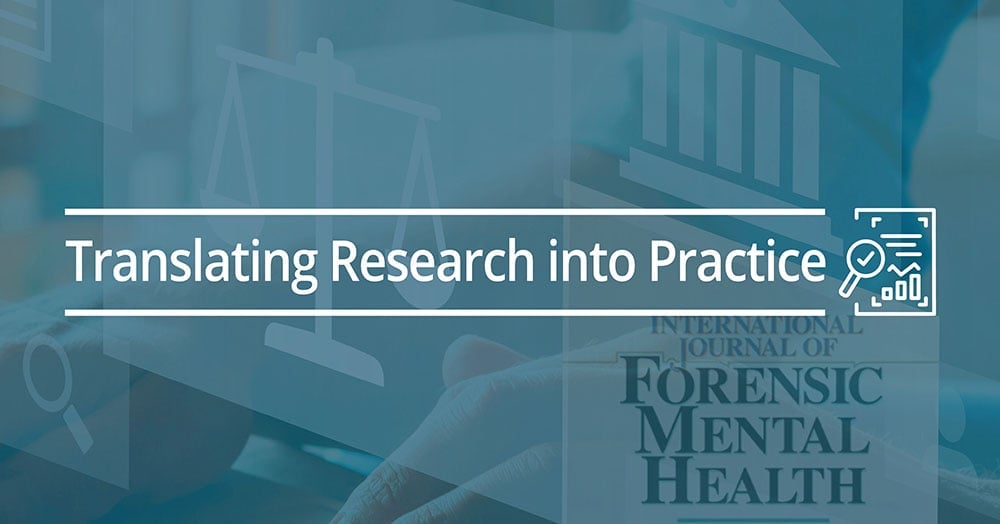Featured Article
Article Title
A Systematic Mixed Studies Review and Framework Synthesis of Mental Health Professionals’ Experiences of Violence Risk Assessment and Management in Forensic Mental Health Settings
Authors
Miriam H. Cohen - School of Health in Social Science, University of Edinburgh, Edinburgh, UK
Ethel Quayle - School of Health in Social Science, University of Edinburgh, Edinburgh, UK
Abstract
Violence risk assessment and management is at the forefront of the work of mental health professionals in forensic mental health settings. Staff working in these settings are presented with many challenges. This review explores how mental health professionals working in forensic mental health settings experience the violence risk assessment and management process. A systematic mixed studies review utilizing PRISMA guidelines was conducted. Sixteen studies were identified for inclusion. Data from qualitative, quantitative, and mixed-methods studies were analyzed together using a data-based convergent synthesis design. Using a best-fit framework synthesis approach, existing data was built upon to allow for a comprehensive qualitative overview of mental health professionals’ experiences. The themes which emerged were: The Patient as a Person; The Caring Relationship; Multidisciplinary Working; and Reliance on Clinical Intuition. Results, clinical implications, and future research directions are discussed.
Keywords
Risk assessment; risk management; forensic mental health; mental health professional
Summary of Research
This review analyzed 16 studies using qualitative, quantitative, and mixed-methods data to understand mental health professionals' experiences through a best-fit framework synthesis approach. The main goal of this study is to review existing research on violence risk assessment and management in FMH services. It aims to understand mental health professionals' dual role of balancing service user care and public safety, explore reasons for preferring clinical judgment over structured assessments, and identify barriers to meaningful collaboration with service users.
Firstly, mental health professionals must navigate tensions between recovery-oriented care and risk management. Balancing these rules becomes even more challenging due to societal views of mental illness as dangerous. Consequently, mental health professionals often feel apprehensive and under pressure to avoid errors when assessing risk. This apprehension then leads to excessive risk aversion. Despite the importance of managing risk, an excessive focus on it may inadvertently increase risk and neglect service users' mental health needs.
Secondly, mental health professionals have long relied on intuitive judgment for risk assessments, lacking standardization. Actuarial risk assessment emerged but was criticized for focusing solely on static predictors and neglecting intervention strategies and recovery-oriented care principles. Structured professional judgment (SPJ), integrating empirical data with clinical insight, addressed these shortcomings. The widely used Historical Clinical Risk Management-20 (HCR-20) instrument combines SPJ and clinical judgment. Despite its use, critiques highlight its limited guidance on risk management and protective factors. Unstructured assessments remain common in FMH services, but their frequency of use over the standardized assessment remains unclear.
Thirdly, collaboration between clinicians and service users is advocated for effective risk management, yet implementation challenges persist, particularly in involuntary settings. Striking a balance between risk assessment and collaborative care remains crucial for promoting recovery-oriented approaches in mental health services.
The current research findings highlight the complex nature of risk assessments in mental health care, underscoring both their potential benefits and limitations. Professionals appreciated the structure and objectivity provided by risk assessments but noted a tendency for assessments to overly focus on risks, neglecting individual resources and protective factors. Barriers to addressing service users' needs included past violent behavior, sheltered environments, and time constraints. The impact of risk assessment on the therapeutic relationship was a significant concern, with professionals feeling conflicted about their dual roles. Research suggested that collaborative discussions with service users could enhance the therapeutic relationship, particularly in challenging situations. Effective multidisciplinary communication was crucial for engaging staff and validating risk assessments, while ineffective collaboration led to disengagement and reliance on subjective judgment.
Translating Research into Practice
Address the dual role dilemma: Mental health professionals often find themselves torn between their role as clinicians providing care and their responsibility to assess and manage potential risks. Acknowledging this conflict allows professionals to navigate it more effectively, ensuring that risk assessment processes do not compromise the therapeutic relationship with the service user.
Consider societal perceptions: Understanding the societal biases (e.g., stigma surrounding mental illness) can help mental health professionals navigate their apprehensions and biases in risk assessment, fostering more accurate and unbiased evaluations while also aiming to balance the dual relationship of providing care and risk aversion.
Promote collaborative risk assessment for treatment planning: Involving service users in the risk assessment process fosters transparency, trust, and collaboration in treatment planning. By actively engaging service users in discussions about risk, professionals gain valuable insights into their perspectives, concerns, and strengths, leading to more comprehensive and person-centered risk assessments.
Enhance multidisciplinary communication: Effective communication among multidisciplinary teams is essential for validating risk assessments and ensuring that all team members have a shared understanding of risk factors and management strategies. Improved communication reduces the likelihood of misunderstandings or discrepancies in risk evaluation, enhancing the overall quality and reliability of risk assessments. Additionally, it can help mitigate biases, such as considering other points of view while being careful of introducing additional biases.
Standardize risk assessment procedures: Establishing standardized risk assessment protocols ensures consistency and increases objectivity in the evaluation process. By adopting evidence-based assessment tools, mental health professionals can minimize the influence of subjective judgment and enhance the reliability and validity of risk assessments across different contexts and practitioners.
Other Interesting Tidbits for Researchers and Clinicians
“Professionals are faced with the dual task of having to balance public safety with service user care. Tensions can play out between FMH services and other organizations with differing priorities. FMH services have an ethical duty to balance recovery-oriented care with risk, whereas other bodies, such as government departments, are required to balance public safety with service user rights. FMH professionals operating under this dilemma need to manage the apparent disconnect between risk management and recovery focused care, while avoiding becoming engrossed in political, institutional, or social pressures” (p.22).






























